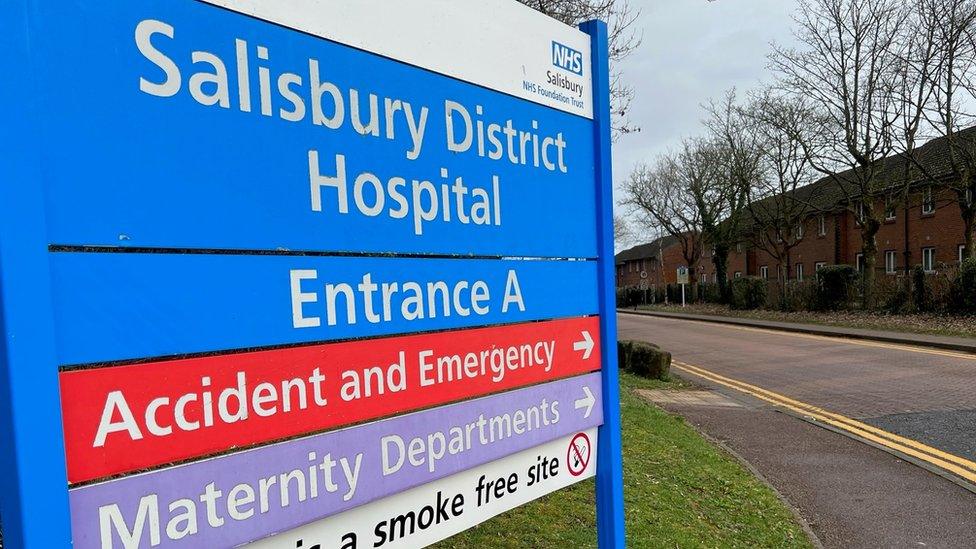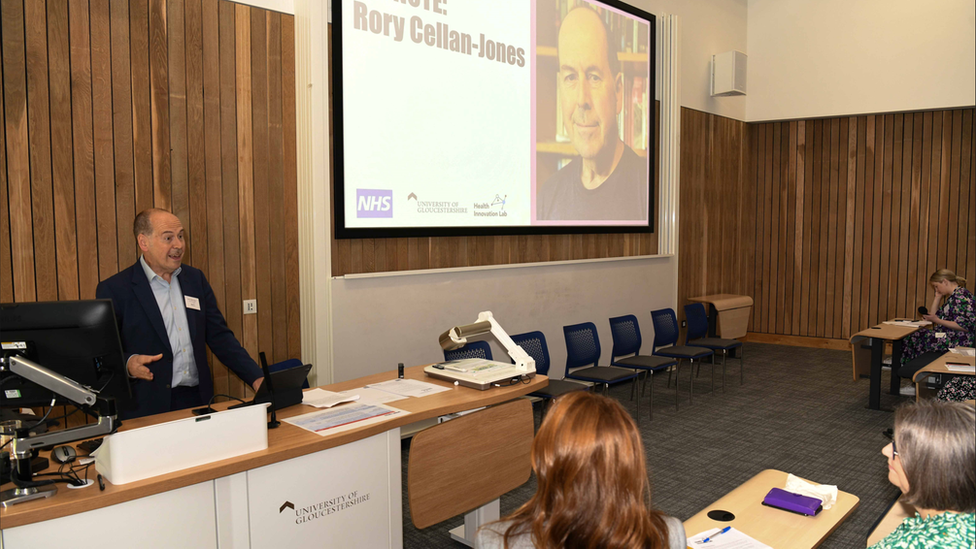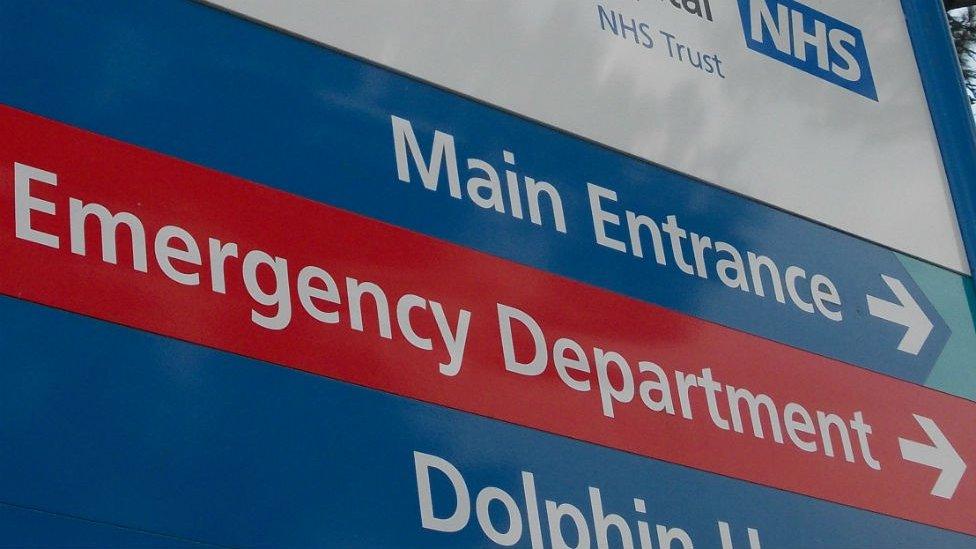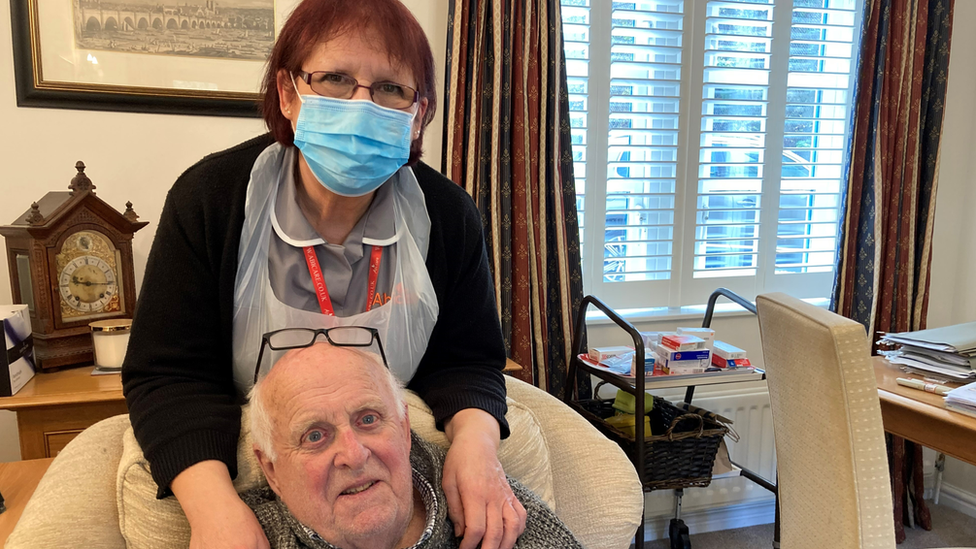Salisbury Hospital has highest level of bed blocking in South West
- Published

Salisbury District Hospital has the highest level of bed blocking in the South West
New data shows Salisbury District Hospital is the worst for bed blocking in the South West.
Health bosses in Wiltshire have repeatedly said NHS pressure will not improve if social care remains "understaffed and underfunded".
According to the data, Salisbury's figures are 15.5% higher than the national average of bed blocking - delays in patients leaving hospital.
The trust said it is working to solve the "really challenging problem".
It comes as around 13,000 people in England remain in hospital each day, even if they are well enough to leave.
With the NHS pressures set to increase over winter, the BBC Shared Data Unit analysed the proportion of people who faced a delayed discharge at every hospital in the country over a 12-month period. The national average is 57.8%.
The BBC shared data unit classes the South West as covering Wiltshire, Gloucestershire, Bath, Bristol, Somerset, Dorset, Devon and Cornwall.
The figures showed between July 2022 and July 2023, external, at Salisbury NHS Foundation Trust an average of 73.3% of patients who had been identified as ready to be discharged were still occupying a bed at midnight.
The numbers were at their highest on Sundays, when 83.4% of patients identified as ready to be discharged that day were still in the hospital.
According to the report, the worst day was 1 July 2022, when 93% of patients who were "no longer meeting the criteria" to be in hospital were still there at midnight. As a result, 99 beds were still occupied.
'Make a difference'
Lisa Thomas, the trust's chief operating officer, said: "Last year we had a difficult winter, but there's things that we've been working on and the changes that we've been making are definitely seeing an improvement.
"Clearly it's a really challenging problem. Money and workforce are really difficult issues in the NHS as a whole, but there are loads of things we are doing to make a difference to the people we serve."

"Bed blockers" are patients who are fit to be discharged, but remain in hospital
In July, the trust launched a discharge hub to speed up the release of patients, and an upcoming "revolutionary" new ward will provide an additional 24 beds.
The Royal United Hospitals in Bath and Great Western Hospital in Swindon are below the national average, with 57.2% and 52.9% of patients remaining, respectively.
The North Bristol NHS Trust had an average of 72.7% of patients ready for discharge remaining in hospital. On 2 August 2022, 351 patients were blocking beds.
In Taunton, a new medical procedure has been rolled out to help bowel cancer patients at Musgrove Park go home the same day after ileostomy closure, which is surgery to reverse a stoma bag. It is the first trust in England to offer the service.
A lack of beds in other settings such as care homes and community hospitals is said to be the biggest problem.
'Support innovation'
An investment of £1.6 billion from the Department of Health and Social Care (DHSC) will be given to leaders of NHS Integrated Care Boards and councils to find the "most effective" way to combat bed blocking and recruit more staff.
A DHSC spokesperson said: "It is vital people receive the right care in the right place, and we are working to ensure patients are discharged safely from hospital, as soon as they are medically fit to do so.

A lack of beds in other settings is one of the reasons why bed blocking is a problem
"A record £1.6 billion investment is supporting this, on top of the £700 million to ease hospital pressures over last winter and the £42.6 million fund to support innovation in adult social care.
"To further bolster the workforce, we are continuing our Made With Care recruitment campaign - designed to reach millions of people - and the average pay for care workers has also increased.
"Staff retention is equally as important, which is why we are also investing almost £2 billion over two years to help councils support the workforce."

Follow BBC West on Facebook, external, X, external and Instagram, external. Send your story ideas to: bristol@bbc.co.uk , external
- Published8 June 2023

- Published5 January 2023

- Published20 January 2023
